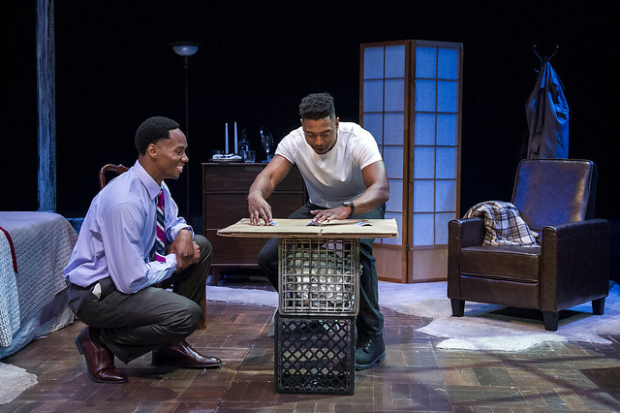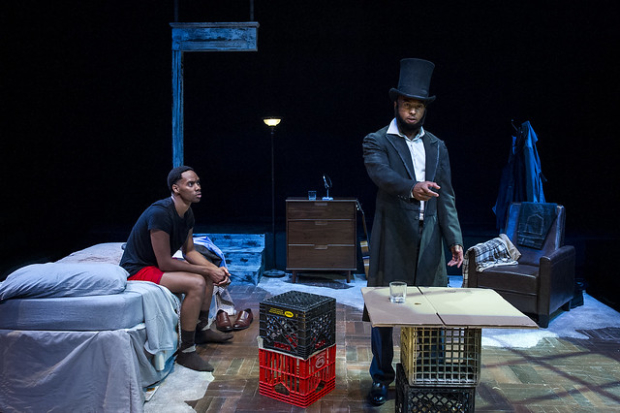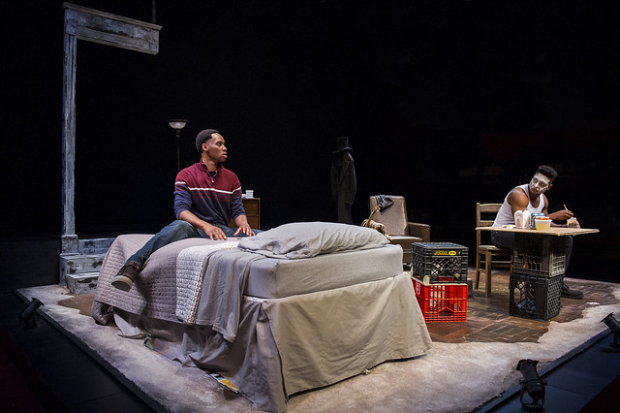Two Black Brothers Expose the Swindle Behind the American Dream in Topdog/Underdog
Suzan-Lori Parks’s Pulitzer Prize-winning play gets an electrifying revival at Shakespeare & Company.

(© Daniel Rader)
Most American schoolchildren are taught that everyone in this country has the opportunity to be whatever they want to be as long as they work hard enough. This, most reasonable adults know, is a lie. For it to be true, all Americans would have to have the opportunities — educational, economic, and otherwise — to rise to their potential. And this has never been the case in America, especially for people of color.
Suzan-Lori Parks's Topdog/Underdog in many ways dismantles the idea of the American dream. The play premiered off-Broadway at the Public Theater in 2001 before moving to Broadway and winning the Pulitzer Prize for Drama in 2002. Parks wrote in an introduction that the play is "about family wounds and healing." After seeing the galvanizing production directed by Regge Life that opened last Friday at Shakespeare & Company in the Berkshires, I can't help feeling that she undersold, perhaps intentionally, the significance of this work, which is about so much more. In 2019, 18 years after its first production, Topdog/Underdog cracks across the stage like a thunderclap.
The play takes place in a run-down rooming house occupied by Booth (Deaon Griffin-Pressley) and his older brother Lincoln (Bryce Michael Wood), both in their 30s. The rumble of a subway (spot-on sound design by Brendan Doyle) and door molding characteristic of a Manhattan apartment suggest the brothers live in New York City. But we see only a portion of the door frame (subtly symbolic set design by Cristina Todesco). Booth and Lincoln inhabit a world of fragments and incomplete things.

(© Daniel Rader)
Booth hustles three-card monte on the streets while Lincoln, who used to do the same, works at an arcade where he dresses up as Abraham Lincoln and gets paid to let people pretend to shoot him. The men come from a broken home; when they were teens, their parents split with new lovers and left the boys with an "inheritance" of $500 each. Booth, who calls himself Three-Card, seems to have inherited his parents' lack of familial responsibility as well when he brags about sleeping with Lincoln's wife, Cookie.
As the men struggle to make ends meet and figure out what they're going to do with their lives, their tense relationship begins to crumble after Lincoln loses his job at the arcade and returns to hustling cards. When he challenges Booth to take him on in a game three-card monte, the contest creates a volcanic atmosphere of rage, envy, and despair as the brothers spiral toward an act of violence that will destroy their fraternal ties forever.
From the production's opening moments, when Lincoln (evocatively silhouetted by Matthew Miller's lighting) stands wearing ghoulish whiteface and a tall crown top hat reminiscent of the 16th president (tongue-in-check costume design by Stella Schwartz), Topdog/Underdog challenges ideas that many audience members hold dear — Abraham Lincoln as liberator, America as a land of opportunity, history as progress toward a greater good for all — and it does so with a rich tapestry of symbolism and allusion.
There's the Cain and Abel rivalry of Lincoln (the topdog) and Booth (the underdog), both vying for prosperity in a land of false promises. There's the dark humor of the brothers' names (their father, we learn, thought it was a good joke), and the twisted irony of a black man being shot at in order to make a living (director Life gets some audience members to laugh unwittingly when Lincoln demonstrates how he takes a bullet). There's also the fraught historical legacy of Abe Lincoln and the as-yet unclosed gap of inequality and injustice that persists in the widening wake of Emancipation.

(© Daniel Rader)
And then there's that most potent symbol of all: the cards. Parks brilliantly draws a parallel between the American dream and a game that sets you up to believe you can win when it has, in fact, always been rigged against you. For people of color, Lincoln shows us, that dream is as big a swindle as a game of three-card monte.
To unpack more of the play's layers of meaning would leave room for little else. And mention must be made of its two actors, Griffin-Pressley and Wood. Both give powerhouse performances in exhaustingly difficult roles, and for two hours and 15 minutes they create a hypnotic chemistry between the rival brothers. If for no other reason than to see Griffin-Pressley and Wood create their stage magic, this production is worth your time. You will want to remember their names.
It can be no accident that Shakespeare & Company decided to stage this play in August 2019, the month that marks the 400th anniversary of the arrival of the first slave ship to America's shores. The legacy of that event informs almost every aspect of Topdog/Underdog, a play which, infuriatingly and sadly, resonates louder than ever in our current divisive political and social climate. It could have been written yesterday, or 50 years ago — and it is that timelessness that makes it a must-see.







